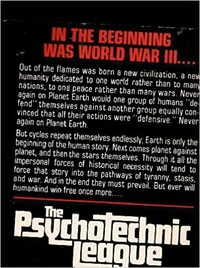Take a photo of a barcode or cover
adventurous
informative
medium-paced
Plot or Character Driven:
Plot
Strong character development:
No
Loveable characters:
No
Diverse cast of characters:
Yes
Flaws of characters a main focus:
No
Four stories in Anderson's larger Psychotechnic universe. Some great geopolitical scheming across all these stories, trying to make sense of what the world might look like post-Cold War, post-singularity, and post-space travel. The Psychotechnic Institute has found a way to use math to predict the future a la Foundation and the best path forward they have found is a collectivist society guided by the newly-reformed UN, opposed by various nationalist factions. The stories are pretty good pre-cyberpunk fare, lots of body modification and post-humanity ideas flying around. A quick read, and fun for the attention given to world building, but not a foundational series by any means.
adventurous
medium-paced
Plot or Character Driven:
Plot
Strong character development:
No
Loveable characters:
N/A
Diverse cast of characters:
No
Flaws of characters a main focus:
No
Classic SF hard science shirt stories. Characterization just minimum to provide setting or motive and if an earlier era.
adventurous
reflective
tense
medium-paced
Plot or Character Driven:
Plot
Strong character development:
No
Loveable characters:
Complicated
Diverse cast of characters:
No
The Psycho-Technic League, although published in 1981, contains a short story and three novellas from Poul Anderson's earlier published work. These "future history" stories are printed in chronological order and linked together with brief interstitials by Sandra Miesel.
Marius (1957)
Un-Man (1953)
The Sensitive Man (1953)
The Big Rain (1954)
The book begins with World War 3 occurring in 1958. All four stories follow a single male revolutionary, spy, or operative taking action for the betterment of humanity, as their personal ideals perceive it. They are often "more" than human, having been enhanced by future technology. The Institute is developed throughout as a benevolent source of scientific advancement, which occasionally interferes in an attempt to change the direction of human society away from war and tyranny.
Overall I find these stories engaging, although some of the political and social viewpoints are quite dated - which Anderson himself admits in the afterward. The final novella, The Big Rain, is my least favorite, primarily due to the violence and misogyny of the main character. Female characters throughout are shallow, rarely presented as anything more than damsels in distress. Despite this, I find the exploration of a potential future that never came to pass interesting and occasionally possessing of insights about humanity that apply equally well today.
Marius (1957)
Un-Man (1953)
The Sensitive Man (1953)
The Big Rain (1954)
The book begins with World War 3 occurring in 1958. All four stories follow a single male revolutionary, spy, or operative taking action for the betterment of humanity, as their personal ideals perceive it. They are often "more" than human, having been enhanced by future technology. The Institute is developed throughout as a benevolent source of scientific advancement, which occasionally interferes in an attempt to change the direction of human society away from war and tyranny.
Overall I find these stories engaging, although some of the political and social viewpoints are quite dated - which Anderson himself admits in the afterward. The final novella, The Big Rain, is my least favorite, primarily due to the violence and misogyny of the main character. Female characters throughout are shallow, rarely presented as anything more than damsels in distress. Despite this, I find the exploration of a potential future that never came to pass interesting and occasionally possessing of insights about humanity that apply equally well today.
History shows as conclusively as our own equations that freedom is not a 'natural' condition of man. It's a metastable state at best, all too likely to collapse into tyranny. The tyranny can be imposed from outside by the better-organized armies of a conqueror, or it can come from within - through the will of the people themselves, surrendering their rights to the father-image, the almighty leader, the absolute state.
Graphic: Gun violence, War
Moderate: Misogyny, Physical abuse, Slavery, Torture, Violence, Kidnapping
Minor: Abortion

